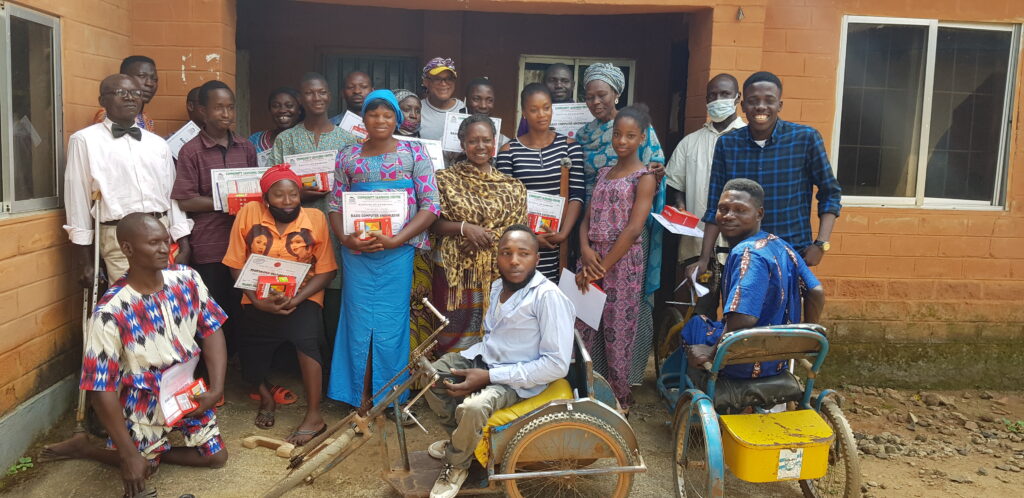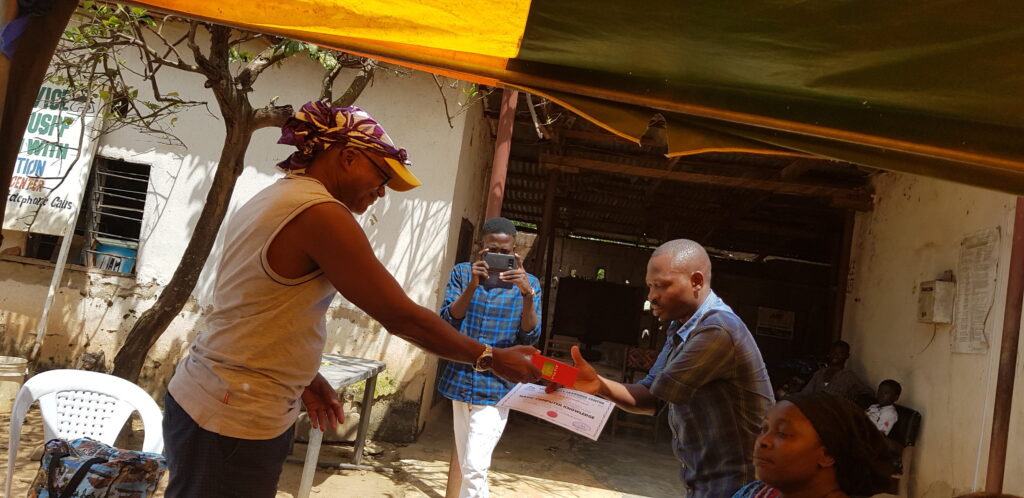Overcoming Disability with Connectivity: Joining Forces with Nigeria’s Fantsuam Foundation
Working toward its goal of eliminating disadvantage, Fantsuam turned its attention to some of the most disadvantaged members of society.
Alex Sudheim

In 2020, we worked with the Association for Progressive Communications (APC) to identify 5 organizations working on projects that strengthen connectivity in their communities – in particular those responding to the COVID-19 crisis. We provided financial contributions to these 5 organizations for them to specifically address the fact that the pandemic has made digitalization and connectivity more necessary than ever before. This series of blogs introduces the organizations that we worked with and what they achieved with their project.
Building Digital Democracy in Nigeria
The Fantsuam Foundation is a charity located in the town of Kafanchan, northern Nigeria. The organisation is dedicated to the elimination of poverty and disadvantage among women and youths through integrated development programs. Among the various grassroots projects run by Fantsuam, the one which shares the purpose of 48percent.org is that of ICT4D, aka Information and Communications Technology for Development.
At a time when official recognition of the need for ICTs in the region was lacking, Fantsuam installed the first satellite internet service for rural northern Nigeria in 1997. Fantsuam’s determination to ensure gender equity in access to ICT knowledge and skills earned it the first Hafkin Africa Prize in 2001 while CEO Kazanka Comfort was awarded First Woman ICT Entrepreneur in Nigeria in 2012.
Fantsuam is furthermore dedicated to building digital literacy and, between 2005 and 2018, its ZittNet Academy trained over 5 000 students. Today, most business centers in Kafanchan are either owned or managed by ZittNet graduates.
Fantsuam also established the first Community Wireless Network in northern Nigeria in 2006. Community networks promote digital democracy in which ownership and control of local communication infrastructure resides in the community. This continues to empower unserved and underserved rural communities and, in true democratic fashion, content is created by the people for the people.
Bridging the Disability Divide with Technology
As COVID-19 continues to leave its irrevocable mark upon humanity, people with disabilities are more vulnerable than most during the uncertainty and instability the pandemic has wrought. It is for this reason that Fantsuam has initiated the ICT Services for Persons with Disabilities program for which it has partnered with 48percent.org.
In 2009, Fantsuam worked to provide digital literacy to people with visual impairment through the use of the JAWS (Job Access With Speech) screen reader technology. It is thus familiar with the implementation of projects aimed at the upliftment of persons with disabilities. Before the pandemic, people with disabilities already experienced exclusion and the denial of their Right to Communicate. It goes without saying that COVID-19 has only made their situation a more challenging one.
Working toward its goal of eliminating disadvantage, with this project Fantsuam turned its attention to some of the most disadvantaged members of society. The program set out to equip 50 persons with disabilities with functional digital literacy skills. Those selected for the project were drawn from the three local government areas of Kaduna State (in which the town of Kafanchan is located) namely Jema’a, Kauru, and Jaba.
As most people with disabilities live with their extended families for support and care, each person in the project represents a household of around 15 individuals. Since the aim is to increase the independence of persons with disabilities, the project thus indirectly benefits approximately 750 people.

Smart Solutions to Connectivity Challenges
The first step of the program was to provide smartphones to the 50 people living with disability who were selected for the project. Once the project participants obtained their digital devices, a series of workshops, seminars and demonstrations was implemented to ensure they acquired the requisite digital skills to make the most of the devices and the digital connectivity they afforded.
Each smartphone came with two months worth of airtime in order to give the recipient time to put in place a system for ongoing airtime purchases. This was achieved by linking each member of the program to members of their communities and voluntary organizations who would pledge to support the recipient with monetary donations towards their monthly airtime.
In addition, during the digital literacy training period, participants were introduced to online business VTU (Virtual Top-Ups) where they were trained in the process of registration to obtain licenses to sell recharge cards for all networks. Via VTU, they could sell digital products such as airtime and data top-ups as well as cable TV subscriptions.
This innovative solution allowed project participants to fund their own airtime and, if their business was successful, even earn additional income to help meet other personal needs and increase their financial independence. Fantsuam encouraged all members of the project to open a savings account within Fantsuam’s own microfinance service to support the growth of their VTU.
Scaling Local Success to National Implementation
Aside from the direct and indirect benefits to the participants and their families, the project has created an opening for the Fantsuam Foundation to become involved in the process of formulating a national policy of digital inclusion for persons with disabilities.
This is an exciting and tremendously significant development as it proves that grassroots initiatives undertaken by NGOs such as Fantsuam have the power to influence policy at the uppermost echelons. This particular project provided irrefutable evidence that what can be accomplished successfully at a local level can be replicated at the national one.
A further accomplishment of the project was that of acting as a catalyst for participants to obtain greater access to local funding and support for their livelihoods. Since the inception of the program, several of its subjects have secured funding for ongoing internet access. The project made an impact on social media, especially among the Nigerian diaspora in the UK, members of whom were inspired to contribute financially to its ongoing success.
Towards the Inclusion of All
With the Fantsuam Foundation dedicated to eliminating disadvantage and 48percent.org committed to equitable access to connectivity, the two organisations naturally found a common purpose for this project. Both are dedicated to the inclusion of those otherwise excluded from society and the economy.
Through this project, Fantsuam has acted as the agent of social, economic and cultural inclusion for people with disabilities from northern Nigeria. By working with 48percent.org to enable 50 disabled individuals to access the internet through smartphones and digital literacy training, they have built an invaluable platform for participation for those who need it most.
Furthermore, such was the salutary success of the project it was able to serve as a persuasive argument that a small victory over exclusion and inequality can be scaled up to produce far grander results. In this regard, Fantsuam has set a powerful precedent proving that, with the right amount of engagement, there is nothing stopping all people with disabilities in Nigeria from transcending their limitations to play an active, meaningful role in society.